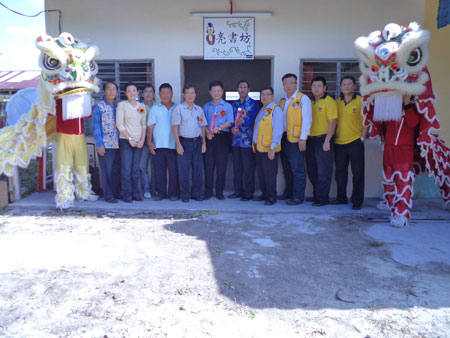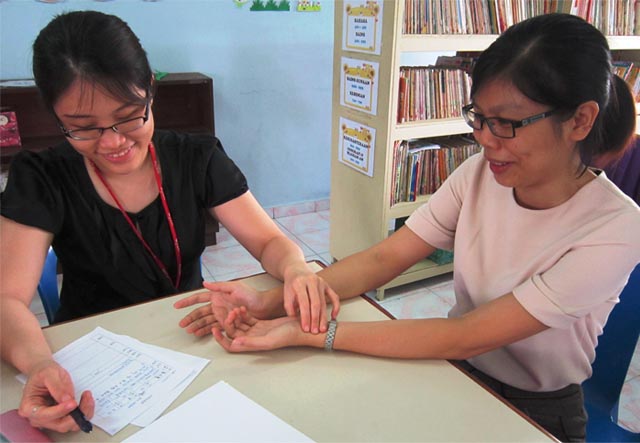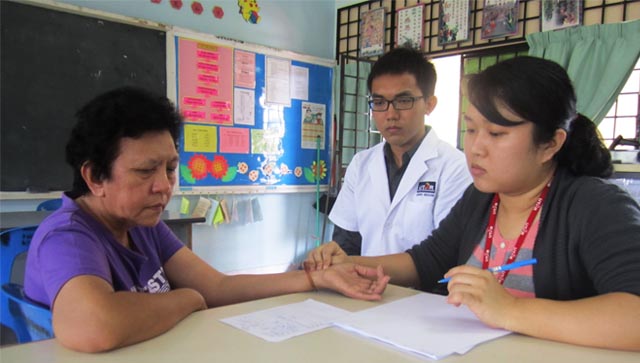
Community service projects promote SDGs
Since 2009, the UTAR New Village Community Service, a sub-programme under the UTAR New Village Community Project (UNVCP) organised by the Department of Soft Skills Competency (DSSC), saw the University continuously giving back to the communities. As it progressed forward, the programme also aligned itself to the United Nations’ Sustainable Development Goals (SDGs). Its many efforts include providing lifelong learning opportunities (Goal 4), as well as enhancing communities’ awareness on the importance of healthy living (Goal 3).
One of the significant events was the setting-up of the village library in Tronoh Mines New Village by the Public Relations students of class 2011. It was part of their Volunteerism Campaign and the establishment of the mini-library was well received by the residents of Tronoh Mines. Named the U-Liang Shufang, the library housed over 500 books when it was officially opened on 26 November 2011. The objective was to provide the residents with a conducive learning environment, as well as to enhance their literacy and reading culture.

The launch of U-Liang Shufang library
One of the residents, also a housewife, Cheah Chee Ying mentioned that the library had become one of the best places for villagers to gather and read. For her family, she said the library helped to cultivate reading habit among her children. She was delighted to see that the children now have more interest in reading.

Parent and children sharing a book
In ensuring healthy living and promoting well-being for all ages, one of the major events conducted saw the support from Department of Chinese Medicine (DCM) under the UTAR Faculty of Medicine and Health Sciences (FMHS) in organising the health screening at SJK(C) Kampung Baru Pajam, Seremban on 22 May 2014.
Aimed at raising the community’s awareness on health and introducing the benefits of traditional Chinese medicine, the medical team provided health services, which included checking blood pressure, monitoring the pulse rate, general consultation on healthy well-being and even traditional Chinese medicine prescription. The villagers who came for the free health screening were comprised of teachers, parents and students.


The medical team conducting health screening for the community
DCM students who participated also saw this activity as a platform for them to do practical training and gain experiential learning. They also mentioned that they gained first-hand experience when they observed how their lecturers attended to the villagers.
While the community services were positively impactful for the communities, participants, who are mainly students, also benefitted much. Given the opportunity to learn in outdoor settings, participants understood that quality education is not merely improving one’s book knowledge and hard skills. They understood the importance of soft skills and the impact it has on them as they apply these skills in their future workplace. The soft skills nurtured include communication and language; ethics and integrity; emotional intelligence, teamwork and leadership; creativity and strategic thinking; and entrepreneurship.
The biggest contribution from the participants would be having the opportunity to interact with the communities. These interactions gaveglimpses and some insights on the problems faced by the communities. Ultimately, participants analysed these problems and gave sustainable solutions for them to address the problems. Looking upon the emphasis on SDGs, the solutions were also meant for the communities to develop their respective village and community in a more sustainable manner. It was also important for the community to learn how available resources in their village could be of great help to bring about sustainability.
© 2020 UNIVERSITI TUNKU ABDUL RAHMAN DU012(A).
Wholly owned by UTAR Education Foundation Co. No. 578227-M LEGAL STATEMENT TERM OF USAGE PRIVACY NOTICE